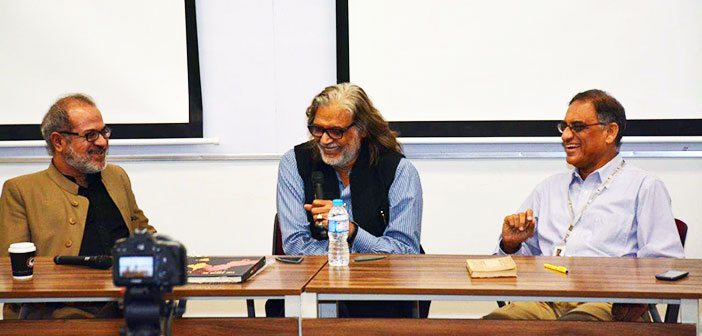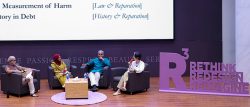KARACHI: Habib University’s ARZU center for Regional Languages and Humanities held a riveting conversation with world famous Bollywood film director Muzaffar Ali on November 18th. The event, attended by some of the brightest stars of Pakistani film and media, as well as students of the university, set a gleaming ambience for the evening. The event was moderated by Dr. Nauman Naqvi, Dean of the School of Arts, Humanities and Social Sciences, as well as by Dr. Asif Aslam, Associate Professor and Director of the ARZU Center.
The evening began with clips from the directors movies, from Umrao Jaan to Gaman, and Anjuman, to showcase the beautifully delicate cinematography and the attention to detail in Muzaffar Ali’s direction. Hailing from Lucknow, the director spoke of his inspiration for each of his movies, of how each movie is a culmination of what he has witnessed as part of a traditional society. “Gaman was my first step towards film-making”, said the director. “When I travelled to Calcutta and became part of the culture of movie making, I saw how traditional society is more in lieu with the realm of written and spoken word, thus (I felt that) the language of moving images opens up a whole new world of possibilities”.
Further delving into the thought process for his movie Gaman, Muzaffar Ali spoke of how he related to the struggle of the common man when they had to adjust to the city life after leaving behind their villages, of how isolating that can be. “Film is a powerful tool, and I feel that to be able to leverage that power through this medium, one has to be deeply connected to one’s roots, only then can you portray issues that pull at you from the inside”, said the director. Focusing on the issue of human helplessness especially, he related to the audience how that issue in particular has a pull like nothing else, and can be seen as the imbalance in cultures and societies where life seems almost depleted of humanity, which is what he portrayed in Gaman.
As a multidimensional artist, Muzaffar Ali pulls inspiration from several different directions. During the event, he spoke with reverence of his parents as inspiration as well. Having come from a background steeped in feudalism, Muzaffar Ali’s father played a great role in helping him realize his values, while his mother, a compassionate patron of human rights, gave rise to his fervent while soft spoken nature. As part of the flowing conversation, Dr. Naqvi commented on the extraordinarily powerful and lyrical undertones of his movies, of how in the effort to become more modern we leave behind our values and how that notion is portrayed in Muzaffar Ali’s movies. Further appreciating the humanism and beauty reflected in his movies, Dr. Naqvi praised his sense of aestheticism and called his movies masterpieces of muted lyricism.
As the evening wore on, the conversation led to poetry, and its impact on Muzaffar Ali’s movies. “Poetry is the mother art, it is a thing connected to the qulm leading to ehsaas”, he said. “Shayar ka azad hona bohat zaroori hai, agar woh azaad na ho to aisa hai jaisay dunya ki saans khatam ho jati hai”. He spoke of how most of his movies are poetry driven, and touched upon the high regard he holds it in. Quoting Faiz Ahmed Faiz, he called poetry a true mirror of society, and how he utilizes it to portray cultures in his movies, especially in Umrao Jaan.
The evening concluded with Muzaffar Ali presenting the moderators of the talk with his own contribution for the library, a 5 part book volume called “The Sufis of Punjab”. He also praised Habib University for being purveyors of a Liberal Arts education in Pakistan, and spoke of how proud he is of everything he’s seen of the institution. “I’m very inspired by the institute, the design of it, the attitude and the people, the longing I see in their eyes to do positive things for their nation. I can clearly see the 5 objectives of Yohsin reflected in the university”, he said.




